US Vice President Kamala Harris began a trip to Asia yesterday to offer reassurances of Washington’s commitment to the region after the chaotic US pullout from Afghanistan and Taliban takeover.
The Taliban’s swift return to power one week ago, along with scenes of thousands trying to flee, have cast a shadow over the US’ status as a global superpower.
On her visit, which includes stops in Singapore and Vietnam, Harris is attempting to allay concerns about US dependability.
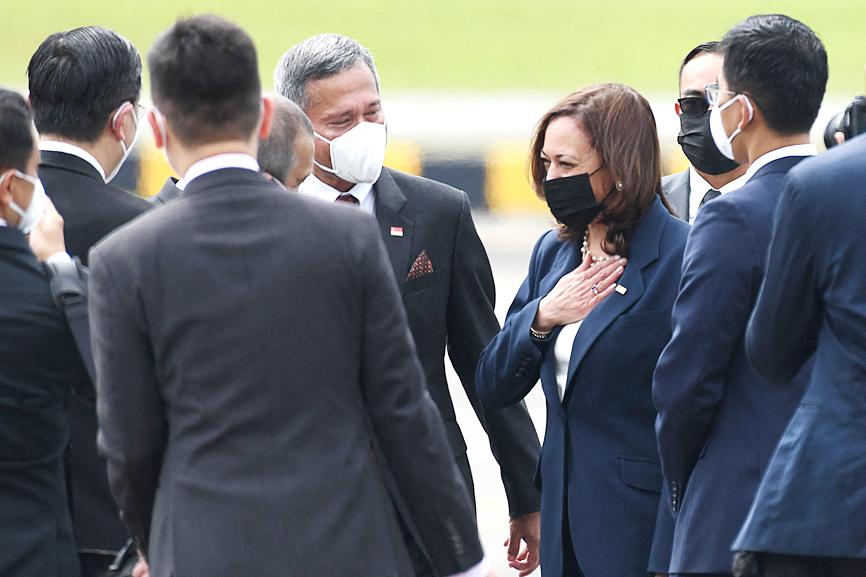
Photo: AFP
“The vice president will make clear throughout the trip that we do have an enduring commitment to the region,” a senior US official said.
Harris, an Asian-American whose mother was of Indian origin, landed in Singapore yesterday and is scheduled to meet the city-state’s leaders today.
The Vietnam leg of her trip has sparked criticism, with some accusing Harris of being tone-deaf for visiting the communist country as US forces struggle to evacuate Americans, other foreigners and Afghan allies from Hamid Karzai International Airport in Kabul.
The crisis has prompted comparisons with the trauma experienced during the US’ withdrawal from Vietnam in 1975, when US helicopters ferried evacuees from the Saigon embassy roof as Viet Cong troops advanced.
US officials say the trip was planned long before the Afghanistan withdrawal and insist Harris is focused on Washington’s broader strategic goals in Asia.
It is the latest visit by a top US official to the region, as US President Joe Biden’s administration looks to build alliances against China and reset relations after the turbulent leadership of his predecessor, former US president Donald Trump.
At a time when China is challenging US political sway and naval dominance in the Indo-Pacific region, Southeast Asia remains “strategically important and economically important to this country,” said a White House official, who asked not to be named. “That hasn’t changed with Afghanistan.”
The Indo-Pacific region is a growing battleground for influence between the US and China, and Washington has repeatedly criticized Beijing’s expansive claims to almost the entire South China Sea.
Taiwan, Brunei, Malaysia, the Philippines and Vietnam have overlapping claims with Beijing in the flashpoint sea.
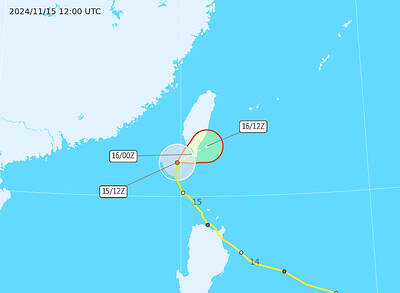
Typhoon Usagi yesterday had weakened into a tropical storm, but a land warning issued by the Central Weather Administration (CWA) was still in effect in four areas in southern Taiwan. As of 5pm yesterday, Tropical Storm Usagi was over waters 120km south-southwest of Oluanpi (鵝鑾鼻), the southernmost tip of Taiwan proper, and was moving north at 9kph, CWA data showed. The storm was expected to veer northeast later yesterday. It had maximum sustained winds of 101kph, with gusts of up to 126kph, the data showed. The CWA urged residents of Kaohsiung, Pingtung County, Taitung County and the Hengchun Peninsula (恆春) to remain alert to
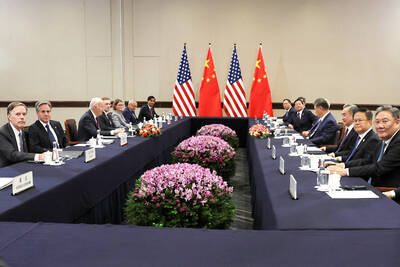
ONE LAST TALK: While Xi said that Taiwan was a ‘red line,’ Biden, in what is likely his last meeting with Xi as president, called for an end to China’s military activity around Taiwan China’s military intimidation and economic coercion against Taiwan are the main causes of tensions that are destabilizing peace in the Taiwan Strait, Taipei said yesterday while thanking US President Joe Biden for expressing Washington’s firm stance of maintaining peace and stability in the region. Biden and Chinese President Xi Jinping (習近平) met on Saturday for their third meeting and their first talks in seven months on the sidelines of the APEC forum in Lima, Peru. It was likely Biden’s last meeting as president with Xi. During their conversation, Biden reiterated the US’ opposition to any unilateral change to the “status quo” from either
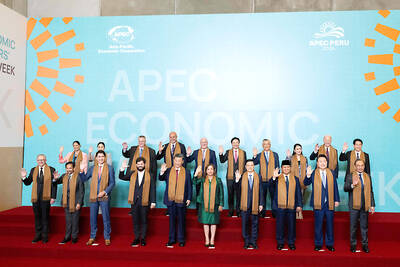
Taiwan would participate in the 2026 APEC summit to be hosted by China after Beijing promised it would ensure the personal safety of attendees, Taiwanese national security sources said yesterday. The APEC Leaders’ Machu Picchu Declaration announced yesterday said that China would host the APEC summit in 2026. Beijing proposed hosting the summit shortly before this year’s gathering began on Friday, a national security official said, speaking on condition of anonymity. Many APEC members expressed concerns about China hosting the event and said that prior communication over the decision was insufficient, the official said. Taiwan brought up concerns about legal “guidelines” China announced in
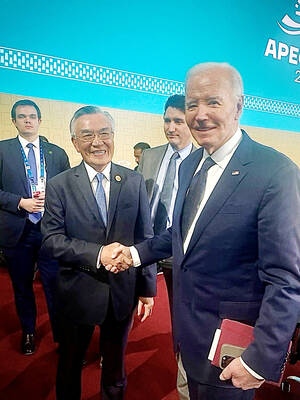
MEET AND GREET: The White House, which called the interaction ‘just a handshake,’ did not immediately respond to a request for comment on whether Biden planned to visit Taiwan’s envoy to the APEC summit, Lin Hsin-i (林信義), on Friday invited US President Joe Biden to visit Taiwan. During the APEC Leaders’ Informal Dialogue, Lin, who represented President William Lai (賴清德) at the summit, spoke with Biden and expressed gratitude to the outgoing US president for his contribution to improving bilateral ties between Taipei and Washington over the past four years, the Ministry of Foreign Affairs said. Lin and Biden exchanged views during the conversation, with Lin extending an invitation to Biden to visit Taiwan, it said. Biden is to step down in January next year, when US president-elect Donald Trump is